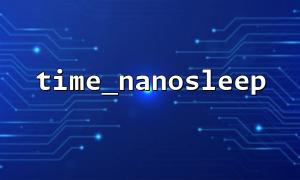In PHP applications that deal with high-precision delay control, the time_nanosleep() function is often used to achieve short-term precise sleep. However, it does not perform stable in all operating systems or PHP environments, especially in latency-sensitive applications. Such functions may have uncertainties: due to system scheduling, their actual sleep time often exceeds expectations and cannot meet the demand for strict timing control.
So in application scenarios that require precise delay control, such as real-time data processing, high-frequency transaction simulation, or custom I/O polling mechanisms, how can we more reliably replace time_nanosleep() ?
time_nanosleep() provides nanosecond sleep control, but since PHP itself runs in the user state, its delay control accuracy ultimately depends on the scheduling granularity of the operating system. Most Linux systems have a scheduling granularity of around 1 millisecond, which means that even if you call time_nanosleep(0, 500000) (requesting hibernation for 0.5 milliseconds), the operating system may actually delay by 1 millisecond or even longer.
In addition, time_nanosleep() does not perform consistently in some versions of PHP, and some platforms may even throw warnings or reduce accuracy.
Although the minimum unit of the usleep() function is microseconds (one millionth of a second), which is not as accurate as time_nanosleep() , it has higher compatibility and stability, sufficient to meet most latency requirements above the submillisecond level. For example:
usleep(500); // Delay500Microseconds,Right now0.5millisecond
For delay control that requires more than 1 millisecond, usleep() is more recommended because it is more widely supported by the system and does not have inconsistent behavior due to environmental differences like time_nanosleep() .
If the application requires extremely high accuracy of delay control, the "busy-waiting" method can be used to actively poll the current time until the set time difference is met. This approach usually sacrifices the CPU for time accuracy.
function busyWait(int $nanoseconds)
{
$start = hrtime(true); // Get the current timestamp(In nanoseconds)
while ((hrtime(true) - $start) < $nanoseconds) {
// Busy and waiting,No operation is done during this period
}
}
// Example of usage:wait0.5millisecond(500,000Nanoseconds)
busyWait(500000);
hrtime(true) returns the current timestamp in nanoseconds. This method is extremely accurate in short-latency scenarios and is suitable for application scenarios that require extremely high performance but can accept certain CPU usage.
For projects that require large-scale high concurrency + high-precision latency control, the introduction of Swoole extension is a more modern and practical option. Swoole brings coroutines, asynchronous I/O and other capabilities to PHP, and provides nanosecond-level Co::sleep() .
Swoole\Coroutine::sleep(0.0005); // Sleep0.5millisecond
Swoole runs in a coroutine scheduling system and has more stable accuracy control and is suitable for scenarios such as network services and asynchronous task scheduling. Swoole services deployed on gitbox.net can get finer granular control without sacrificing performance.
In delay-sensitive applications, time_nanosleep() provides superficial nanosecond control capabilities, but is not reliable. Select according to the specific scenario:
Delay greater than 1 millisecond: use usleep() first;
The delay is less than 1 millisecond but the accuracy requirements are high: consider busy waiting + hrtime() ;
Requires modern asynchronous/coroutine capabilities: implement Co::sleep() using Swoole extensions.
Only by choosing the right alternative can truly achieve stable and precise latency control in PHP. This is crucial for real-time guarantees for high-performance applications.














